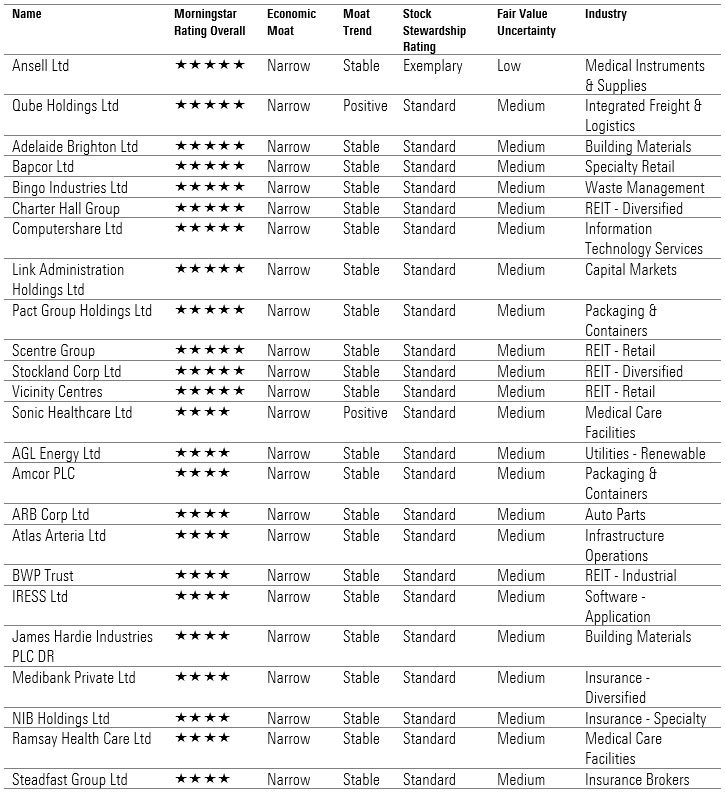5 new quality cheap stocks for your watchlist
The near-term is likely to get uglier but there are plenty of ‘survivor’ stocks to consider.
Mentioned: ARB Corp Ltd (ARB), Charter Hall Group (CHC), James Hardie Industries PLC (JHX), Macquarie Group Ltd (MQG), Ramsay Health Care Ltd (RHC), Sonic Healthcare Ltd (SHL)
The Australian Bureau of Statistics forecasts that 86 per cent of businesses will be affected by the corona fallout.
Morningstar analysts believe that while the near-term is likely to get uglier, increased collective effort globally is expected to lead to containment of the coronavirus outbreak sometime over the next nine months.
"We expect near-term impact to be savage, shaving off 2 percentage points from global GDP growth," Morningstar director of equity research Johannes Faul says in a new special report detailing how individual sectors are faring in the coronavirus induced market turmoil.
"However, we anticipate a vaccine ready to be deployed by mid- to late 2021, setting the stage for a return to normality."
Today we’re looking for survivors. From our perspective, great companies are those that have carved out solid (and in some cases growing) competitive advantages that will allow them to thrive for years to come—in Morningstar parlance , they’ve built economic moats. Such companies are typically led by adept managers who have a record of allocating capital in ways that add value.
To find stocks to fit the bill, we screened for the following:
Economic moat: First, they need to boast wide Morningstar Economic Moat Ratings—and their Morningstar Moat Trend Ratings need to be stable or positive. In other words, these companies have competitive positions that are steady or even improving. Firms with wide Morningstar Economic Moats have unmatched advantages that should allow them to fend off their competitors and out-earn their costs of capital for the next 20 years.
Fair value certainty: Second, we need to have a high degree of certainty in our fair value estimates for the stocks of these companies, limiting our search to stocks with fair value uncertainties of low. This rating represents the predictability of a company's future cash flows. As such, we have a pretty high degree of confidence in our fair value estimates of companies with low and medium uncertainty ratings. (Long version: The uncertainty rating captures a range of likely potential intrinsic values for a company based on the characteristics of the business underlying the stock, including such things as operating and financial leverage, sales sensitivity to the economy, product concentration, and other factors. If the range of potential intrinsic values is narrow, the company earns a low uncertainty rating. If the range is great, the company earns a high uncertainty rating.)
Discounted: Third, the stocks of these companies must be trading at a decent discount to our fair value estimates—selling at Morningstar Ratings of 4 or 5 stars at the of writing.
Lastly, we tossed out companies with Poor stewardship ratings, preferring to ride along with management teams that have a proven record of being adept capital allocators.
Good stewards of investors capital have a proven record of making investments and acquisitions supporting the competitive advantages and core businesses of their companies—and they won't pay an arm and a leg to do so. They'll divest underperforming or noncore businesses. They'll find the right balance of investing in the business and returning cash to shareholders via dividends and share repurchases. And they'll assemble a portfolio of attractive operating assets and skilled human capital, and then execute well.
We used the Morningstar Stock Screener to look for these qualities. More than thirty stocks made the cut.
Don't think of this as a list of "buys," though. Instead, think of it as a collection of names to investigate further.
"A 5-star rating does not suggest that the stocks won't drop further," he says. "Our aim is not to pick the bottom, but to highlight to investors that they can pick names up at a discount," says Faul.
Since we delivered you this list last week, five new names have been added and three dropped. New additions came from two providers of medical care facilities—Sonic Healthcare (ASX: SHL) and Ramsay Health Care (ASX: RHC) —auto parts manufacturer ARB Corp (ASX: ARB), real estate investment trust Charter Hall Group (ASX: CHC) and building materials firm James Hardie Industries (ASX: JHX).
Sydney Airport (ASX: SYD) was removed after its fair value uncertainty was raised to ”high”.
"We have assessed our valuations for Auckland Airport and Sydney Airport amid the rapidly evolving global pandemic and have downgraded both stocks given their weaker short-term earnings outlook," regional director of equity research Adam Fleck says.
"We make minimal changes to our midcycle forecasts as we anticipate travel returning to normal by early calendar year 2021.”
Fleck continues to expect growth in the Asian middle class to drive relatively strong passenger growth over the long term.
Global asset manager Macquarie Group (ASX: MQG) was also removed due to a raising in its uncertainty rating. Analyst Nathan Zaia says the downgrade reflects downside risk from cyclical earnings and capital destruction. Both? stocks still screen as undervalued.
Note: This is a snapshot of how these stocks stand at the time of writing: Thursday 26 March. Given the current market volatility, the valuations could jump around. See the individual stock pages for full analysis.
Wide moat Australian stocks

Narrow-moat Australian stocks

Source: Morningstar
Editor's note: Read the latest on how the coronavirus is rattling the markets and how investors can navigate the volatility.

